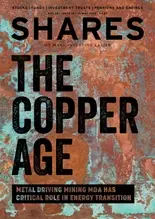The Bank of England left interest rates unchanged on Thursday, but momentum appeared to build for a rate reduction ahead as another policymaker joined the ’doves’ recommending a cut.
At its May meeting, the BoE’s Monetary Policy Committee voted by a majority of 7–2 to maintain Bank Rate at 5.25%. Two members preferred to reduce Bank Rate by 0.25 percentage points, to 5%.
Seven members, Bank of England Governor Andrew Bailey, Sarah Breeden, Ben Broadbent, Megan Greene, Jonathan Haskel, Catherine Mann and Huw Pill voted in favour of the status quo.
Two members, Swati Dhingra and BoE Deputy Governor Dave Ramsden voted to reduce Bank Rate by 0.25 percentage points, to 5%.
At its March meeting, only Dhingra had recommended a rate cut.
The BoE said the restrictive stance of monetary policy is weighing on activity in the real economy, is leading to a looser labour market and is bearing down on inflationary pressures. Key indicators of inflation persistence are moderating broadly as expected, although they remain elevated.
The BoE said monetary policy will need to remain restrictive for sufficiently long to return inflation to the 2% target.
It said it will consider forthcoming data releases and how these inform the assessment that the risks from inflation persistence are receding.
The BoE said updated forecasts show CPI inflation returning to close to the 2% target in the near term, but to increase slightly in the second half of this year, to around 2.5%, owing to the unwinding of energy-related base effects.
CPI inflation is projected to be 1.9% in two years‘ time and 1.6% in three years in the May Report.
UK GDP is expected to have risen by 0.4% in the first quarter of 2024 and to grow by 0.2% in the second quarter. Despite picking up during the forecast period, demand growth is expected to remain weaker than potential supply growth throughout most of that period.
The pound fell to $1.2448 following the decision after trading at $1.2491 shortly before.
Numbers last month showed the UK consumer price inflation rate was a touch loftier than expected in March.
According to the Office for National Statistics, the year-on-year rate of consumer price inflation ebbed to 3.2% in March, from 3.4% in February.
A slowdown to 3.1% was expected, according to FXStreet cited consensus, however. Nonetheless, it was still the tamest rate of inflation since it sat at 3.1% in September 2021.
The rate of inflation in the UK hit a recent peak of 11.1% in October 2022, it has, albeit bumpily, eased since then.
Copyright 2024 Alliance News Ltd. All Rights Reserved.



